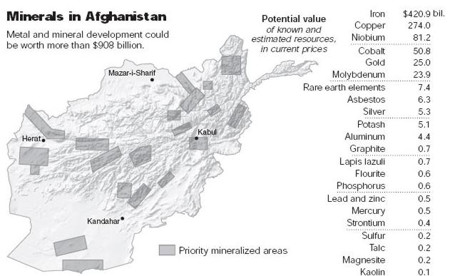The international community has been pumping huge sums of money into Afghanistan for more than a decade, but the country remains one of the world's 10 poorest.
The World Bank estimates that 15.7 billion dollars in aid flowed into the country last year alone.
The economy has been growing at more than 9 per cent on average for several years, but from an extremely low base.
That growth is based almost entirely on foreign support, without which experts predict that the fragile economy would collapse.
The international community is expected to pledge its support beyond the troop withdrawal deadline in 2014, at the Afghanistan conference in the western German city of Bonn on December 5.
“Experience shows that the withdrawal of international troops reduces civilian aid,” the World Bank warned in a recent study.
That would not only hurt economic growth, but could also threaten to destabilise Afghanistan, the bank said.
Foreign aid has considerably improved living conditions and raised average annual income, but is still only 528 dollars, it said.
Even with an economic growth of 6 per cent, it would take 22 years for incomes to double.
Child mortality also remains the highest in the world, the study warned. Three-quarters of the population is unable to read or write, and life expectancy is barely more than 48 years.

(Photo: http://rockhoundblog.com/regular-postings/u-s-identifies-vast-riches-of-minerals-in-afghanistan/)
Some are looking to underexploited mineral resources to provide a longer-term economic solution than foreign aid.
“Around 92 percent of the gross national product is presently financed directly or indirectly by donors,” said the German advisor to the Economics Ministry in Kabul, Alfred Kraft.
Large, barely exploited mineral deposits “are the country's only chance to free itself from donor dependency,” Kraft said. “But that will take a long time.”
Nevertheless, Afghans have high hopes for their commodities.
“We are beggars sleeping on gold,” said one senior civil servant, who wished to remain anonymous.
Mines Minister Wahidullah Shahrani said he believes the mineral resources are worth even more than the estimated 3 trillion dollars.
Shahrani expects mineral extraction to pour an annual 1.5 billion dollars into state coffers from 2016.
He predicted the figure would rise to 4 billion dollars by 2026, and said the sector will contribute 20 billion dollars to the wider economy - more than the entire current gross domestic product.
But not all analysts are as optimistic.
“It is not clear how abundant the mineral resources actually are, or how easy it will be to exploit them,” said Gunnar Waelzholz, the Kabul head of the German Reconstruction Bank, or KfW.
“The exploitation will give the state large revenues. But this does not automatically mean it will benefit the population at large,” he said, noting a range of problems.
“A stable security situation is a prerequisite for direct investments from abroad. The legal framework also needs to be improved; we need more legal security to protect investments,” he said. “Corruption is still an inhibiting factor.”
He also cited a lack of heavy industry or manufacturing base.
“It will be difficult to make the Afghan economy competitive.”
The country does, however, have small businesses. One entrepreneur is Basir Hamidi. The 42-year-old lived and studied in the German city of Erlangen, but returned to Afghanistan for a holiday in 2007, and decided to stay.
He started a small group of companies working in media and the energy sector. His business has grown from two employees to 20.
“You can make money here. And you can make very good money,” he said.
For now, Hamidi's work depends largely on international means, such as making films funded by foreign aid organisations. And he also concedes that corruption is “a disease.”
Nevertheless, he believes Afghanistan has a future after 2014.
“There will be better times,” he said. “The world has given us this opportunity. We must use it. We have not often had this chance in the past.”



